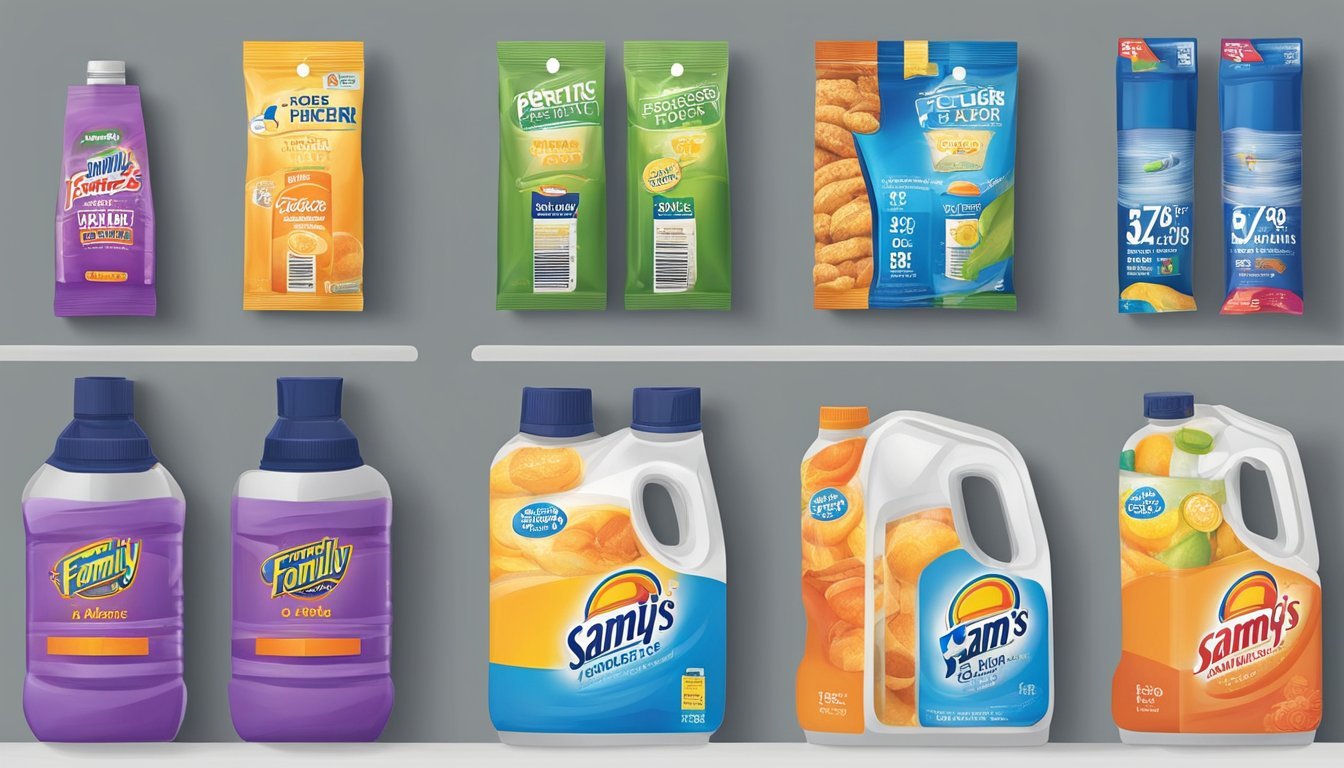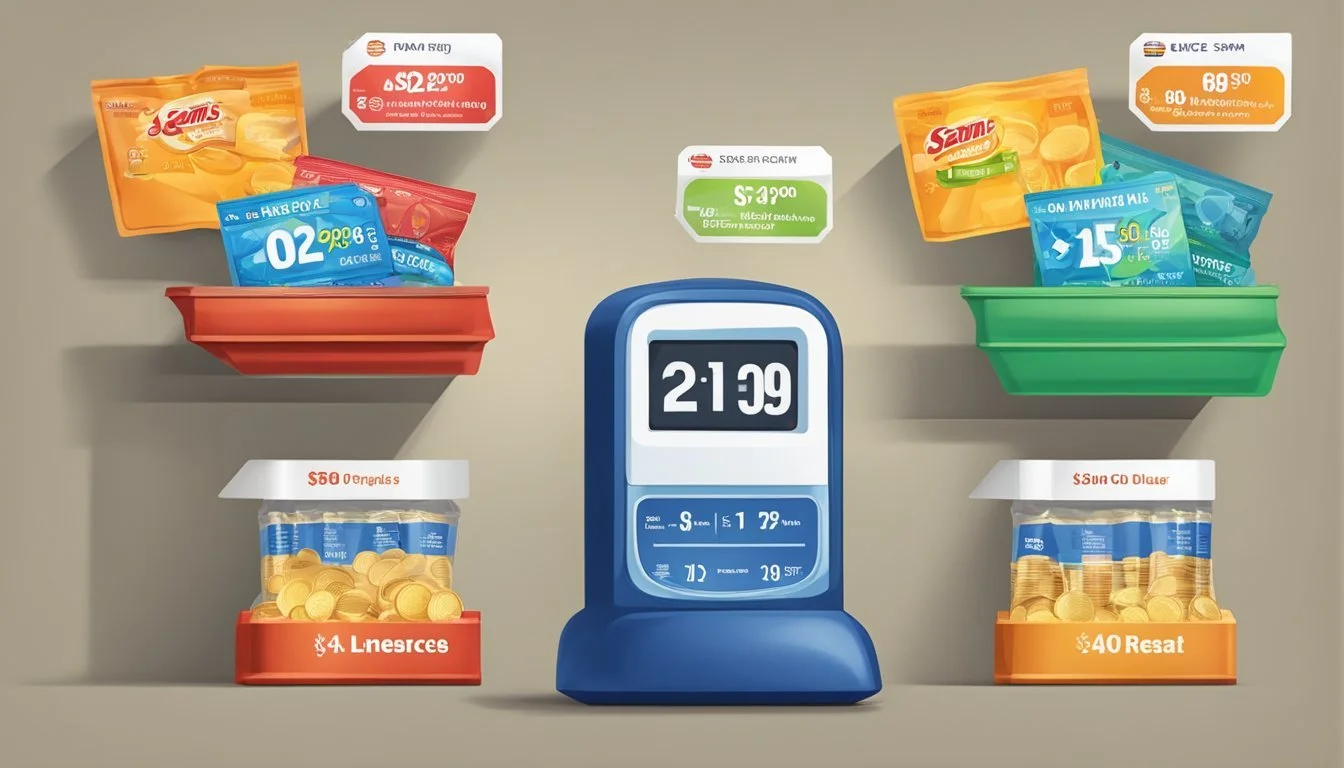Is Family Dollar Cheaper Than Sam's Club?
A price comparison of budget retailers
Family Dollar and Sam's Club represent two different approaches to budget shopping. Family Dollar offers everyday low prices on a variety of household items and groceries. Sam's Club, a membership-based warehouse store, provides bulk purchases at discounted rates.
When comparing prices between these retailers, it's important to consider factors beyond just the sticker price. Generally, Sam's Club offers lower per-unit prices on many items due to its bulk purchasing model, potentially leading to greater savings for consumers who can buy in large quantities. However, Family Dollar may be more cost-effective for smaller households or those seeking individual items.
Both stores offer their own unique discounts and savings opportunities. Family Dollar frequently runs sales and promotions on select products, while Sam's Club provides member-exclusive deals and cashback rewards. The best choice for budget-conscious shoppers depends on their specific needs, shopping habits, and ability to store bulk purchases.
Understanding Wholesale Clubs and Discount Retailers
Wholesale clubs and discount retailers operate on different business models to provide value to consumers. These models impact pricing, product selection, and shopping experiences.
Business Models of Wholesale Clubs and Discount Retailers
Wholesale clubs like Sam's Club focus on selling bulk quantities to members. They offer a wide range of products, from groceries to electronics, at discounted prices. These clubs negotiate directly with manufacturers to secure lower costs.
Discount retailers such as Family Dollar aim to provide everyday low prices on smaller quantities. They typically stock a more limited selection of items, focusing on essential household goods and consumables.
Wholesale clubs generate revenue through membership fees and product sales. This allows them to maintain lower markups on merchandise. Discount retailers rely solely on product sales, often with higher margins to cover operational costs.
Membership Structures and Fees
Sam's Club requires an annual membership fee for access to its stores and services. This fee helps offset lower product margins and provides additional revenue. Members can choose between basic and premium tiers, each offering different benefits.
Basic memberships at Sam's Club start around $45 per year. Premium memberships cost more but include perks like cash back on purchases and free shipping for online orders.
Family Dollar does not have a membership program. It operates as a traditional retailer, allowing anyone to shop in its stores without fees. This approach aims to attract a broader customer base seeking affordable goods without commitment.
Comparative Price Analysis
Family Dollar and Sam's Club offer distinct pricing strategies for their products. While both aim to provide value, their approaches differ significantly in terms of product selection, package sizes, and overall cost savings.
Average Price Comparison for Common Products
Family Dollar focuses on everyday low prices for individual items. Groceries like cereal, canned goods, and snacks are often priced competitively. Household items such as cleaning supplies and paper towels are available in smaller quantities at budget-friendly rates.
Sam's Club, in contrast, specializes in bulk purchases. Their prices for common products like diapers, paper towels, and groceries are typically lower per unit when bought in large quantities. A 12-pack of paper towels at Sam's Club may cost less per roll than a 4-pack at Family Dollar.
Here's a quick comparison of average prices for some common items:
Item Family Dollar Sam's Club Cereal (per oz) $0.20 $0.15 Paper Towels (per roll) $1.50 $1.00 Diapers (per diaper) $0.25 $0.18
Bulk Purchase Savings and Deals
Sam's Club excels in bulk purchase savings. Members can access significant discounts on large quantities of products. For instance, a 50-pound bag of rice or a 36-count pack of toilet paper offers substantial savings compared to smaller packages at Family Dollar.
Family Dollar compensates with frequent sales and promotions. They often run "Buy One, Get One" deals or dollar specials on select items. These promotions can lead to significant savings on specific products, especially for shoppers who don't need large quantities.
Sam's Club also provides exclusive member-only deals and instant savings offers. These can include discounts on electronics, appliances, and seasonal items not typically found at Family Dollar. The membership fee at Sam's Club can be offset by these savings for frequent shoppers.
Brand and Product Selection
Family Dollar and Sam's Club offer distinct product selections and brand options. Their approaches to private labels and name brands, as well as product variety, cater to different consumer needs and shopping preferences.
Private Label Brands Versus Name Brands
Family Dollar emphasizes its house brand, offering budget-friendly alternatives to popular products. These private label items cover essentials like cleaning supplies, snacks, and personal care products. Sam's Club, on the other hand, features its Member's Mark brand, which spans a wide range of categories including groceries, household goods, and even furniture. Sam's Club also stocks a larger selection of name brands, often in bulk sizes.
Product Variety and Exclusivity
Sam's Club boasts a broader product range than Family Dollar. It carries everything from groceries and electronics to clothing and large appliances. The warehouse club offers exclusive items and limited-time specialty products not found in traditional retail stores. Family Dollar focuses on everyday essentials, providing a smaller but more targeted selection of household items, snacks, and basic clothing. While Sam's Club excels in bulk purchases and variety, Family Dollar aims to meet immediate needs with convenient, smaller-sized products.
Membership Benefits and Services
Sam's Club offers members exclusive perks and savings opportunities. The club provides two membership tiers with varying benefits to suit different needs and budgets.
Exclusive Member Services
Sam's Club members gain access to discounted prices on a wide range of products. They enjoy savings on groceries, electronics, home goods, and more. Members can take advantage of fuel stations with competitive gas prices.
The club's pharmacies offer prescription medications at reduced costs. Tire and auto services are available at member-only rates. Free health screenings and discounted eye exams are additional perks.
Members can use convenient services like curbside pickup. This allows for easy ordering and collection of items without entering the store.
Additional Perks for Plus Members
Plus members receive extra benefits beyond the standard membership. They earn 2% cash back on qualifying purchases, up to $500 annually. Free shipping is included on most items, with no minimum order required.
Early shopping hours give Plus members exclusive access before regular store hours. They get free select prescriptions at Sam's Club pharmacies.
Plus members enjoy additional savings on glasses and contact lenses from the optical center. They can add up to 16 complimentary memberships for friends or family at a discounted rate.
These enhanced benefits aim to provide greater value and convenience for frequent shoppers.
Location and Convenience
Family Dollar and Sam's Club differ significantly in their store locations and shopping options. These factors play a crucial role in determining which retailer is more accessible and convenient for customers.
Store Proximity and Accessibility
Family Dollar operates over 8,000 stores across the United States, primarily in urban and suburban areas. These smaller-format stores are often found in neighborhood shopping centers, making them easily accessible for quick trips. Sam's Club, on the other hand, has fewer locations, with around 600 warehouse stores nationwide. These superstores are typically situated in suburban areas with ample parking lots to accommodate their larger format.
Sam's Club stores offer a wider range of products and services, including pharmacies and business supplies. However, their locations may require longer travel times for some customers. Family Dollar's numerous locations make it more convenient for day-to-day purchases in many communities.
Online Shopping and Delivery Services
Sam's Club has a robust online presence through samsclub.com, offering a full range of products for delivery or pickup. Members can enjoy free shipping on many items, with some exclusions for oversized products. The retailer also provides curbside pickup services, allowing customers to order online and collect their purchases without entering the store.
Family Dollar's online shopping options are more limited. While they offer some products for purchase on their website, their e-commerce platform is not as comprehensive as Sam's Club. Family Dollar focuses primarily on in-store shopping experiences, with less emphasis on delivery services.
Sam's Club's superior online shopping infrastructure and delivery options provide greater convenience for customers who prefer to shop from home or have busy schedules.
Investing in Membership
Membership fees at wholesale clubs like Sam's Club require careful consideration. The decision to invest depends on potential savings and shopping habits.
Calculating the Return on Membership Investment
Sam's Club offers two membership tiers: Club and Plus. The basic Club membership costs $45 annually, while Plus is priced at $100. To justify this investment, shoppers must save more than the membership fee through discounts and deals.
For frequent shoppers, the savings can be substantial. Bulk pricing on groceries, household items, and electronics often results in lower per-unit costs compared to traditional retailers. Plus members enjoy additional perks, including 2% cash back on qualified purchases.
Families, small business owners, and those who shop in large quantities typically see the greatest return on their membership investment. However, individuals with limited storage space or who shop infrequently may struggle to recoup the annual fee.
Comparing Annual Fees and Expenses
When evaluating membership costs, it's crucial to compare Sam's Club fees to potential savings. The $45 Club membership can be worthwhile for shoppers who spend at least $2,250 annually, assuming a conservative 2% savings rate.
Plus members need to spend more to break even. At $100 per year, the 2% cash back benefit requires $5,000 in annual purchases to offset the fee. However, this tier offers extra savings opportunities through early shopping hours and free shipping on most items.
It's important to factor in additional expenses like gas for trips to the store and the temptation to overspend on bulk items. Shoppers should also consider the value of time saved by making fewer shopping trips for frequently used items.
Store Policies and Customer Experience
Family Dollar and Sam's Club have distinct approaches to customer policies and in-store experiences. Their return policies, service levels, and shopping environments differ significantly, impacting the overall value proposition for shoppers.
Return Policy and Customer Service
Family Dollar offers a 30-day return window for most items with a receipt. Customers can exchange products or receive store credit. Sam's Club provides a more generous policy, allowing returns on most items without time limits. Sam's Club members enjoy additional perks like free technical support for electronics.
Family Dollar's customer service is primarily in-store, with limited options for remote assistance. Sam's Club offers more comprehensive support through multiple channels, including phone, email, and live chat. Members have access to dedicated service lines, reducing wait times.
Sam's Club's membership program includes benefits like early shopping hours and exclusive savings events. Family Dollar does not require membership, making it more accessible for occasional shoppers.
Shopping Environment and Experience
Family Dollar stores are typically smaller, focusing on quick, convenient shopping trips. Aisles are narrow but well-organized, stocking everyday essentials and household goods. The checkout process is usually fast, with multiple registers open during peak hours.
Sam's Club warehouses are spacious, designed for bulk shopping. Wide aisles accommodate large carts and pallets. Stores feature product demonstrations and free samples, enhancing the shopping experience. Self-checkout kiosks and mobile scan-and-go options speed up the payment process.
Family Dollar's layout emphasizes affordability, with prominent discount signage. Sam's Club showcases a broader range of products, including high-end electronics and appliances. The warehouse setting may feel less personal but offers a treasure hunt atmosphere for bargain-seekers.








